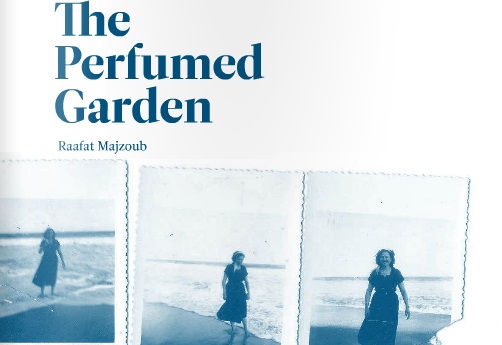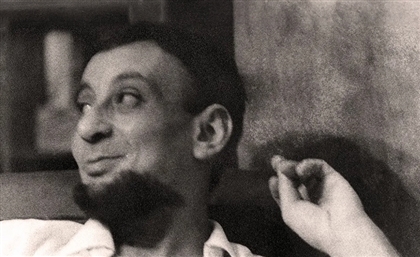The Perfumed Garden: Raafat Majzoub
With a futuristic, multidisciplinary approach to writing a novel, Lebanese author Raafat Majzoub looks to casting real people and their stories to make up his upcoming work - an autobiography of the Arab world. Anam Sufi delves in and finds out more.

Ernest Hemmingway once said, “when writing a novel a writer should create living people; people not characters. A character is a caricature.” Emulating such a view, Lebanese writer, architect, and artist, Raafat Majzoub, is involved in an ongoing creative process to complete a novel that is informed by a series of multimedia experiments. These experiments include films and interviews with a random selection of personas from across the Arab world. These documented interactions are then placed within the context of the novel, inspiring the setting, character traits and appearances, and narratives with a dose of reality.
Majzoub himself describes the transcription of documented research into literary content; “I am very interested in ways of transferring reality into different forms of narratives, so casting people for my novel through video seemed like the obvious thing to do. Sometimes I fall in love with a character and decide to import them into the novel as they are, and other times I fall in love with a sentence or a physical gesture and decide to combine them in different character collages.”
What offers such a research methodology particular profundity is the way in which reality is used to inspire a world of fiction. Entitled, The Perfumed Garden, the novel is an autobiography of an Arab world that is free from the confines of sexual taboos and stringent boundaries that are ever apparent today. The title is itself adopted from Muḥammad ibn Muḥammad al-Nafzawi’s 15th century Arabic sex manual and work of erotic literature, furthering the significance of sex in Majzoub’s work.
It’s no new feat to use sex as a subject in art for shock value, or at least this is the opinion I hold. You see it all the time, established and up-and-coming artists’ desperate and gratuitous uses of sexuality to sell art these days, particularly in the Arab world. However, unlike your token oh-my-days-I-painted-a-breast-and-am-therefore-the-new-Picasso-of-my-time, Majzoub is able to respect the fine line between relevance and overuse. I had the pleasure of reading the first chapter of The Perfumed Garden, and found its blended narratives and sexual exposure to add both symbolic and literal depth to Majzoub’s fictitious world.
Another detail revealed whilst reading the completed excerpt from the novel was how the narrative includes a fast paced fluctuation of subjects and characters that the protagonist encounters along his path. When asked to elaborate on his stylistic decision for The Perfumed Garden, Majzoub described his intention; “I want readers to fall in and out of love of the characters until their hearts are exhausted. I later want them to learn to love the place by seeing its potential through a fiction that is not really or entirely fictional. As the chapters roll forward, protagonists disappear, and others reappear. Secondary characters mesh with supposedly primary characters. The only constant is the place: the Arab world as The Perfumed Garden.”
You’re probably wondering what the defining characteristic of such a place might be? It is not simply a place identifiable by the environment, but also by those who occupy and exist within it. Thus, the setting is also heavily elaborated on through the use of sexuality. By now you might be thinking that you accidentally wandered onto a review of the Kama Sutra, but bear with me. I too felt inquisitive as to what so many sexual allusions were attempting to express, and I don’t think I can explain it any better than the author himself;
“Sex is good. I really think it’s very interesting to observe our egos while fucking. We’re interesting when we’re naked and run by instinct. The title of the project, The Perfumed Garden, is in reference to the fifteenth century erotic manual. A Tunisian Hafsid ruler commissioned the job at the time. I think it’s interesting that it was doable then, but now we’re all afraid of our and each other’s genitalia… My imagined Arab world is more run by desire than by acquired constructs, and to me, different types of sex can help out with that.”
The amalgamation of characters and subject matters ultimately takes on a highly fluid and ambiguous form. It is therefore to no surprise that when asked whether he had a post-modernist text in mind when selecting the narrative structure of the novel, Majzoub cited Haruki Murakami as being amongst his notable influences. And much like the works of Murakami, it is a taxing endeavor to try to explain a story that’s charm depends on its ambiguity.
The research methodology being used for The Perfumed Garden reminded me of Aristotle’s concept of mimesis and the idea that art is mimetic and therefore cyclical in the way in which one form of art or experience gives birth to a new form. The result of such cosmopolitan creativity seems to be a novel that will prove fundamental in capturing the social mores and cultural dichotomies that are so verdant in the Arab world today. In what I have seen so far, both in video and in text, I for one am very intrigued by what the completed novel will look like.
If you’re interested in observing some of the documentation for the novel, visit: www.theperfumedgarden.info
And for a sneak peek into the first chapter that was published in The Outpost Magazine, click here.
- Previous Article The Final El Fusion
- Next Article Nomades Land























